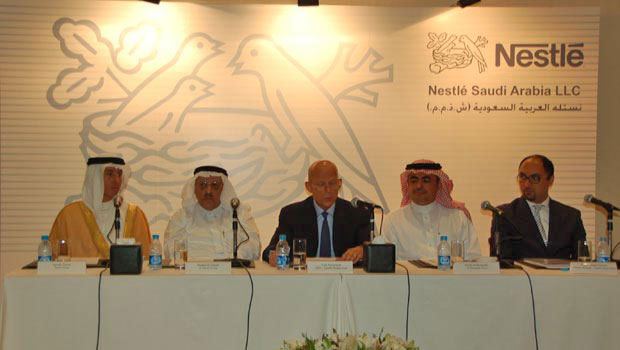Nestlé Middle East announced Tuesday that it will commence direct sales and distribution operations in Saudi Arabia. The move makes Nestlé one of the first "fast moving consumer goods" (FMCG) multinationals to have a direct operational presence in the Kingdom, following the recent decision by the Saudi government to further open up the national economy by allowing international companies to set up and manage their sales and distribution operations.
Nestlé products were distributed in the Kingdom previously by Basamh Trading Company.
When Saudi Arabia joined the World Trade Organization (WTO) in 2005, there were predictions that an end to the agency system would be the inevitable result of membership, because foreign companies were effectively given the green light to set up operations on their own. However, until now there has been little evidence that foreign manufacturers wanted to do so. They had preferred to stay with their local partners, in particular because of the agents' knowledge of the local market.
While addressing a press conference here Tuesday evening, Yves Manghardt, chairman and CEO of Nestlé Middle East FZE, said: "We see the commencement of direct sales and distribution operations as the beginning of a new and exciting chapter in Nestlé's long operational history in Saudi Arabia." He said Nestle's presence in Saudi Arabia, the Arab world's largest economy, has played a key role in the company's remarkable growth and continued success in the region. "Nestlé has been operating in Saudi Arabia for more than five decades through multiple agents, whose resourcefulness and commitment to our shared values allowed us to establish a strong presence in the domestic market."
Nestlé Saudi Arabia will be headquartered in Jeddah, the Kingdom's commercial capital, with branch offices in Riyadh and Alkhobar.
Commenting on Nestle's announcement, John Sfakianakis, chief economist at Banque Saudi Fransi, said: “It means that one of the largest and most prominent multinational companies in the fast moving consumer goods, including food stuffs, sees great value in Saudi Arabia as it's an important hub with a real and growing population. Jeddah is strategically situated in order to cater to the local market as well as Africa and the rest of the Middle East. The industrial city of Jeddah is set to benefit as an industrial hub.”
He said Nestlé is a firm with great history and depth which few other possess around the world, bringing important know-how which should eventually trickle down. Consumers should eventually benefit in terms of quality priced products. Time will tell how other market players will react as competition is always healthy.
Echoing Sfakianakis remarks, Jarmo T. Kotilaine, chief economist at the National Commercial Bank, said: “The decision by major global companies to set up direct operations in Saudi Arabia is a very welcome development. It reflects the growing global stature and importance of the Kingdom's economy which is further underpinned by attractive growth prospects, rising disposable incomes and favorable demographics.”
For the Saudi consumer, he said, such a direct presence entails lower prices, greater supply security, and increased flexibility in the face of evolving market conditions. For the broader economy, this naturally means new job and revenue opportunities. It is to be hoped that the compelling market dynamics that have drawn Nestle to Saudi Arabia will boost the interest of other companies as well. As a result of a range of reforms over the past decade, the process of seizing the opportunities offered by the Kingdom has become dramatically easier, indeed very simple by global standards.
“Foreign companies can play a key role in Saudi Arabia's diversification efforts, not only by introducing new sectors and activities but also by bringing in technology and know-how, thereby boosting Saudi Arabia's physical and human capital base,” Kotilaine added.
Manghardt said that with its strategic location, world-class infrastructure and progressive economic policies, Saudi Arabia provides us with right environment for success. Right from the time we signed our first agency contract in 1955 with Basamh Trading Company, the authorities in the Kingdom have been very supportive, whether in terms of administrative procedures, customs clearance or infrastructure facilities.
The company, which aims to employ around 225 people in the first year of operations, is determined to exceed the local Saudization targets and is already at 30 percent as of Day 1.
Roger Meguerdichian, country manager, Nestlé Saudi Arabia, said, "Nestlé's commitment to young Saudi talents goes beyond meeting the Saudization targets as we are looking to partner with key universities and institutions in the Kingdom through the establishment of the Nestlé Center Of Excellence, which is composed of a sales training academy, Nestlé female Nutrition Development Program and our Graduate Development Program for young Saudis. These initiatives will not only ensure a continuous flow of local talent to the organization, but will also contribute to the development and training of external Saudi national graduates by allowing them to benefit from the Nestlé expertise."
Nestlé's successful water operation in Saudi Arabia, Al Manhal, will remain managed by separate manufacturing, sales and distribution joint ventures.
“The Kingdom of Saudi Arabia, with its 28 million inhabitants and its sizable youth population, presents tremendous growth opportunities for Nestlé and together with our partners we are keen to capitalized on these opportunities by expanding the scope of our activities in the coming years,” Manghardt said.
He added that Nestlé’s Middle East region, with its 200 million inhabitants, holds great promise for Nestlé and our continued commitment and ongoing investment demonstrate our confidence in the region. Nestlé Middle East has invested more than $400 million in the region since its formal inception in 1997, owning and operating 17 factories and 37 offices, employing more than 7,000 people.










